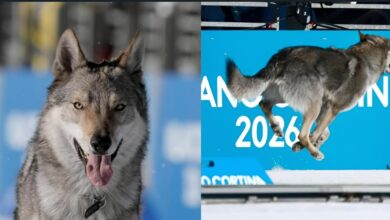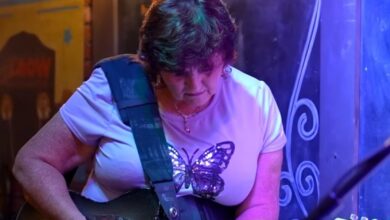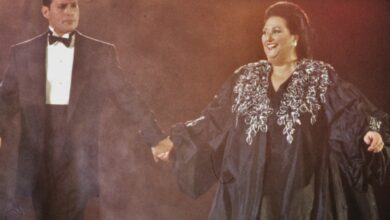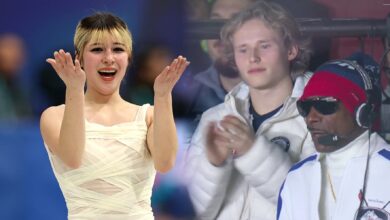Steven Tyler and YUNGBLUD Team Up with Steve Martin for a Stunning New Version of “My Only Angel” — and Fans Like This Version Even Better
Everything about this collaboration feels like an unexpected spark that somehow makes perfect sense. On October 24, 2025, Aerosmith’s Steven Tyler and YUNGBLUD unveiled the “Desert Road Version” of their song “My Only Angel,” featuring none other than Steve Martin on banjo. What reads like an eccentric musical experiment turns into something hauntingly cohesive—a slow-burning reimagining that trades stadium fireworks for desert moonlight. Instead of polish and flash, the song breathes with a raw, cinematic warmth, its melody unfolding like a mirage seen from a lonely highway.
The partnership between these artists took shape with almost startling speed. Only a month earlier, the first version of “My Only Angel” arrived as the lead single for their upcoming EP One More Time, scheduled for release on November 21. That debut felt like a charge—a statement that Aerosmith wasn’t a nostalgia act but a force capable of rewriting its own legacy. The “Desert Road” rendition takes that same flame and slows the burn, replacing urgency with patience, adrenaline with reflection. It doesn’t just rework a song; it reframes the mood, inviting listeners to hear familiar emotions in unfamiliar colors.
Their collaboration’s roots stretch back to a night that already felt legendary—the 2025 MTV VMAs. That evening, Tyler and Joe Perry joined YUNGBLUD and Nuno Bettencourt for an unforgettable tribute to Ozzy Osbourne, powering through “Crazy Train,” “Changes,” and “Mama, I’m Coming Home.” It was chaotic and perfect—a generational handshake wrapped in pure volume. Photos from backstage captured wide smiles, a sense of shared mischief, and the quiet hum of something bigger forming. Out of that chemistry came studio sessions, one track, an EP, and eventually this desert-soaked reinterpretation that feels both spontaneous and fated.
What makes the “Desert Road Version” mesmerizing isn’t just the musicianship but the restraint. Steve Martin’s banjo glides through the mix like desert wind, filling the gaps with echo and light. Instead of crowding the sound, his lines trace outlines—brief, shimmering replies to each vocal phrase. The result is a texture that’s at once rustic and cinematic. Where the original leaned on firepower, this version builds emotion from silence, from the friction between breath and distance, from the quiet courage to say less.
Vocally, the interplay between Tyler and YUNGBLUD feels electric yet human. Tyler’s weathered rasp finds balance in YUNGBLUD’s sharp-edged urgency, the two voices meeting like lightning hitting dry ground. In the first mix, they were warriors fighting to be heard over roaring guitars. Here, they’re storytellers sharing the same horizon line. Every syllable lands with intent, every harmony shaped by the shared gravity of two artists who understand the difference between shouting and being heard. This is rock stripped of swagger, rebuilt on honesty.
When the original version topped Billboard’s Hot Hard Rock Songs, it confirmed that curiosity and craft still move people. But rather than chasing that victory with louder singles, Aerosmith and YUNGBLUD took a detour. A month later, they released an alternate take that swapped distortion for dust, guitars for grain. Instead of capitalizing on momentum, they used it as a bridge to something subtler—a reminder that reinvention doesn’t require rebellion, only perspective. It’s proof that evolution and reverence can occupy the same frequency.
The brilliance of Steve Martin’s contribution lies in how naturally it fits. Known to many as a comic icon, Martin is also a seasoned bluegrass artist with an ear for nuance. He doesn’t enter the track as a guest star but as a collaborator, weaving his instrument into the song’s DNA. His banjo becomes both rhythm and commentary—each note a heartbeat beneath the melody. His touch lends the track its heartbeat, bridging old-school Americana with Aerosmith’s timeless rock instinct.
Aerosmith’s reemergence in this era carries weight beyond the song itself. More than a decade since their last full studio record, teaming up with YUNGBLUD reframes them not as veterans chasing relevance but as architects testing new blueprints. Their upcoming EP One More Time promises a collision of minds—Tyler and Perry reuniting with fresh energy, YUNGBLUD injecting modern chaos, and producer Matt Schwartz sculpting it all into cohesion. The “Desert Road” version acts as a prelude, a creative thesis that says: history only matters if you keep rewriting it.
Musically, this rework edges toward Western gothic rather than straight rock. The guitars hum like twilight, the percussion thumps like footsteps in sand, and Martin’s banjo flickers where cymbals once flared. The atmosphere trades gloss for grit, yet nothing feels diminished. You can sense the heat waves in the mix, the kind that blur the horizon. It’s less about genre and more about geography—the sound of wide spaces and long memories finding each other in rhythm.
“My Only Angel” always carried the ache of parting, but here it feels almost sacred. What began as a dramatic farewell transforms into something tender and human—like saying goodbye while still holding hands. The song’s narrative, when framed through this desert imagery, reads as both surrender and blessing. It’s not about leaving anymore; it’s about understanding why you have to. Tyler and YUNGBLUD sing as if they’re sending the same message across time, their voices bound by empathy rather than echo.
Steve Martin’s reaction to the release summed it up perfectly. He posted online, half-joking but genuinely proud: “I’m playing banjo on a Steven Tyler song!” It was a cultural collision that delighted the internet—part humor, part awe. What it revealed, though, was the sense of joy that powered the whole project. Every strum and vocal take carries that same playful confidence, proof that collaboration works best when it’s born from curiosity, not calculation.
Stepping back, this union feels like a blueprint for rock’s future. When generations stop competing and start conversing, new hybrids emerge. The VMAs were their spark, “My Only Angel” their bridge, and this “Desert Road” rendition the afterglow—an intimate drive through open air. It’s music that remembers where it came from while daring to ask where it might go next, guided by instinct rather than expectation.
From a career standpoint, the collaboration makes strategic and emotional sense. Aerosmith’s legacy audience meets YUNGBLUD’s fearless online community, and Steve Martin adds a third axis of cultural nostalgia. Yet it never feels manufactured. Instead, it feels like an open invitation to anyone drawn to authenticity, regardless of genre. This isn’t crossover for clicks—it’s connection by design, crafted with the understanding that sincerity never goes out of style.
The production of the “Desert Road” mix shines through its restraint. Acoustic guitars bloom like mirages, pianos drift like fading sunlight, and the banjo’s pulse anchors everything with quiet purpose. Reverb lingers just enough to suggest space without drowning intimacy. The arrangement leaves room to breathe, each pause a deliberate heartbeat between words. It’s the kind of mix that rewards patience, unfolding slower than modern streaming trends allow—precisely why it hits harder.
Live, this duality opens endless possibilities. The band could ignite a set with the original’s force, then dim the lights for the “Desert Road” to tell its story anew. Or they could reverse the sequence, letting stillness erupt into fire. Two interpretations of one song, both equally valid, both expanding what the audience feels. It turns a single composition into theater—a reminder that reinvention doesn’t replace the past; it dialogues with it.
What lingers after listening isn’t the novelty but the sincerity. Steve Martin could’ve been a headline gimmick, YUNGBLUD a youthful accent, Tyler a nostalgic presence. Yet together, they transcend all that. It’s the sound of generations collaborating without compromise, of humor and heart coexisting. “My Only Angel (Desert Road Version)” doesn’t just reinterpret a track—it redefines what timeless means. The journey may begin on a dusty road, but it ends in perfect harmony.





